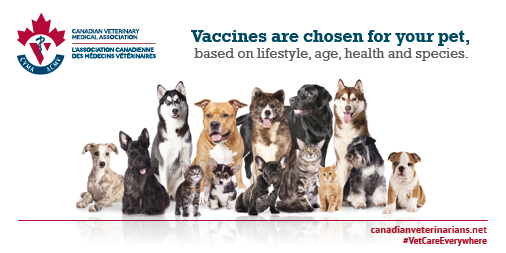
Updates on Vaccinations for your Dog
You may have seen on the news or social media recently that vaccinations for your canine family member could be getting more complicated.
Everyone knows about the core vaccinations recommended for dogs – that would be the rabies vaccination and the Distemper, Adenovirus, Parainfluenza and Parvovirus (DAPP) vaccination. It is recommended that all dogs receive these two vaccinations at the very least because of the potential devastating or fatal consequences of these diseases. Rabies is also required by law for human health protection.
Two other “lifestyle” vaccines that have been around for a long time are leptospirosis and kennel cough (a large percentage of dogs are also vaccinated for these).
Leptospirosis is a zoonotic (transmissible to people) bacterial infection which is caused by a family of organisms called Leptospira interrogans. There are several strains (called serovars) of the bacterium. Leptospirosis can cause severe disease and is potentially fatal. The bacteria attack the liver and kidneys and this can lead to damage or failure of these organs. The bacteria are carried by wildlife, such as rats, other rodents, skunks and raccoons, but infected dogs can also act as a source of the infection. Dogs can become infected with the Leptospira bacterium when they drink from puddles or ponds or come into contact with wet grass that is contaminated with the urine of infected animals. All breeds of dogs are susceptible to this infection. Ingestion of infected urine is the most important way dogs become infected, but some forms of the bacteria can penetrate damaged or very thin skin also. Around the City of Kawartha Lakes area we strongly recommend the leptospirosis vaccination for almost all dogs because unfortunately we do have this in our area.
Kennel cough is a broad term covering any infectious or contagious condition of dogs where coughing is one of the major signs. It is also called infectious tracheobronchitis (this describes the location of the infection). Several viruses and bacteria can cause kennel cough, often at the same time. These include adenovirus type-2 (different from the adenovirus type 1 that causes infectious hepatitis), parainfluenza virus, and the bacterium Bordetella bronchiseptica. Because the infection spreads when dogs are housed together, it is often seen soon after dogs have been in kennels/groomers/doggie daycare/dog parks, hence the name “kennel cough.” So dogs that visit these types of places are recommended to have a kennel cough vaccination.
The two new vaccinations we need to consider for our pooches are: Lyme vaccination and Canine Influenza Virus.
Lyme disease is caused by a spirochete, Borrelia burgdorferi. A spirochete is a type of bacterium. Dogs get Lyme disease through the bite of an infected tick. Don’t forget people can also get Lyme disease from tick bites! Symptoms of Lyme disease can be difficult to detect in dogs. They do not typically get the “rash” that humans develop. The symptoms of the disease can be quite delayed from the time of infection making it even harder to recognize the disease. Symptoms can include high fever, shifting leg lameness and even kidney failure. Unfortunately with global warming, migration of birds and other animals the incidence of Lyme disease (and other tick borne diseases) is increasing in Ontario.
If you have found ticks on your dog the past few summers and/or your dog could be at higher risk – i.e. Walks in nature trails/reserves, cottaging, hunting dogs, or dogs that travel to endemic areas (such as New York, Quebec, Point Pelee, etc) you should consider also vaccinating against Lyme disease.
Canine Influenza Virus is a highly contagious virus. There are two strains (H3N2 and H3N8) that are known to affect dogs. Signs of CIV include cough, runny nose, fever, lethargy, eye discharge and decreased appetite. It is typically not fatal for healthy dogs however dogs with existing health issues, old or young dogs or brachycephalic breeds are at more serious risk including pneumonia. For a long time we haven’t had to worry about CIV in this part of Ontario. Unfortunately both Canada and US now have confirmed cases. In Ontario, it has been identified in Windsor with recent outbreaks in Orillia and Port Hope/Cobourg areas – which is getting pretty close to us here in Lindsay!
When should you consider vaccinating your dog against CIV? We are currently recommending it for dogs travelling to infected areas, if your dog comes in contact with dogs imported from Asia, if your dog goes to shows, or is in contact with lots of other dogs (i.e. Puppy and training classes, daycares, boarding kennels, groomers) or dogs that have underlying heart or lung diseases.
And that’s a quick overview on the changing face of vaccinations for your canine pal! If you ever have any questions about vaccines or what vaccines your pet should be protected with please do not hesitate to call us with questions!

